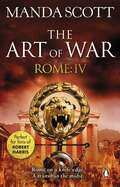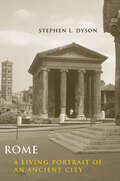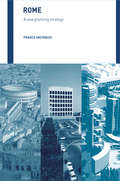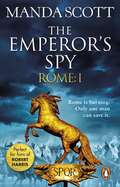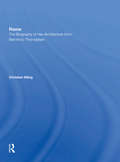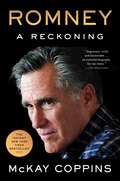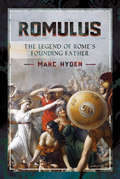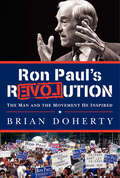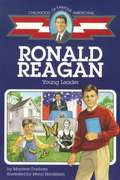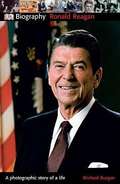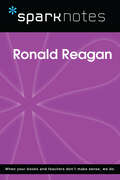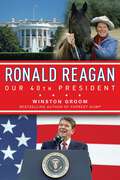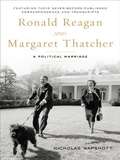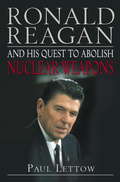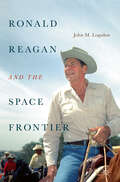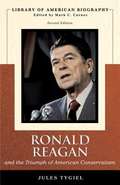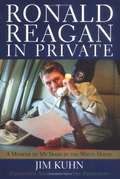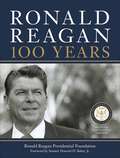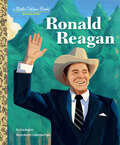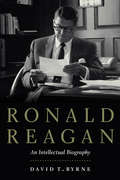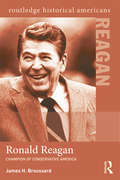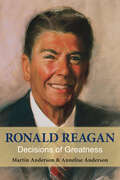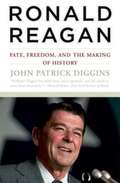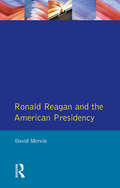- Table View
- List View
Rome: (Rome 4): A captivating historical page-turner full of political tensions, passion and intrigue
by Manda ScottThe Sunday Times bestselling author Manda Scott brings Ancient Rome to life in this memorable tale of treachery, espionage and violence. Perfect for fans of Simon Scarrow, Robert Harris and Conn Iggulden."Superior in almost every way...one of the most entertaining "Roman" novels I have read...Head and shoulders above the crowd" -- Simon Scarrow"Intricately woven, cleverly plotted. Miss this at your peril!" - Ben Kane "Excellent series - each book was a joy to read - final book kept you guessing right up until the end" -- ***** Reader review"A superb and exciting read, finished at 3am, and which I cannot recommend enough..." -- ***** Reader review"There's only one way in which I could say Manda Scott's work is predictable: every time I pick up a new Scott book, I can guarantee it will be new, refreshing, fascinating and totally different from anything that's gone before." -- ***** Reader review***************************************************ROME ON A KNIFE EDGE. A TRAITOR IN THE MIDST. Rome: AD69. The Year of the Four Emperors. Three Emperors have ruled in Rome this year and a fourth, Vespasian, has been named in the East.As the legions march toward civil war, Sebastos Pantera, the spy whose name means leopard, returns to Rome intent on bribery, blackmail and persuasion: whatever it takes to bring the commanders and their men to Vespasian's side.But in Rome, as he uses every skill he has ever learned of subterfuge, codes and camouflage, it becomes clear that one of those closest to him is a traitor, who will let Rome fall to destroy him.Together the two spies spin a web of deceit with Rome as the prize and death the only escape.
Rome: A Living Portrait of an Ancient City (Ancient Society and History)
by Stephen L. DysonStephen L. Dyson has spent a lifetime studying and teaching the history of ancient Rome. That unparalleled knowledge is reflected in his magisterial overview of the Eternal City.Rather than look only at the physical development of the city—its buildings, monuments, and urban spaces—Dyson also explores its social, economic, and cultural histories. This unique approach situates Rome against a background of comparative urban history and theory, allowing Dyson to examine the dynamic society that once thrived there. In his personal effort to reconstruct the city, Dyson populates its streets with the hurried politicians, hawking vendors, and animated students that once lived, worked, and studied there, bringing the ancient city to life for a new generation of students and tourists. Dyson follows Rome as it developed between the third century BC and the fourth century AD, dividing the great megalopolis into distinct neighborhoods and locales. He shows how these communities, each with its own unique customs and colorful inhabitants, eventually grew into the great imperial capital of the Italian Empire. Dyson integrates the full range of sources available—literary, artistic, epigraphic, and archaeological—to create a comprehensive history of the monumental city. In doing so, he offers a dramatic picture of a complex and changing urban center that, despite its flaws, flourished for centuries.
Rome: A New Planning Strategy
by Franco ArchibugiRome: A New Planning Strategy looks at the problems of a city over the last century and suggests a totally new planning strategy. The book examines the stages that have marked the increase of population and change in land use and analyses the masterplans used to try and control these evolving conditions. Using Rome as an extended case study, the book deals with the socio-economic effect of an absence of planning strategy during the recent growth of the city. The author presents the characters and features of a new masterplan based on his many years of experience in theoretical and practical planning.
Rome: A high-octane historical adventure guaranteed to have you on the edge of your seat… (Rome #1)
by Manda ScottFrom THE SUNDAY TIMES BESTSELLING author Manda Scott, a heady, fast-paced and exciting historical adventure full of religious and political tensions, passion and intrigue. Perfect for fans of Simon Scarrow, Robert Harris and Conn Iggulden."As exciting as Ben Hur, and far more accurate..." - The Independent."A gripping tale..." - Daily Mail."I was totally engrossed..." - ***** Reader review. *****************************************AD 64: ROME IS BURNING. ONLY ONE MAN CAN SAVE IT. The Emperor: Nero, Emperor of Rome and feared by his subjects for his temper and cruelty, is in possession of an ancient document predicting that Rome will burn.The Spy: Sebastos Pantera, assassin and spy for the Roman Legions is ordered to stop the impending cataclysm. He knows that if he doesn't, his life - and that of thousands of others - is in terrible danger.The Chariot Boy: Math, a young charioteer, subject to the wiles and schemes of the Emperor and the Spy. Who will win this game, where death stalks the drivers - on the track and off it. The series continues in Rome: The Coming of the King.
Rome: The Biography of Her Architecture From Bernini to Thorvaldsen
by Christian EllingThis book deals with the city of Rome and its buildings in the period between Bernini's death in 1680 and the year 1797, when Thorvaldsen came to the papal city. It focuses on dealing mainly with some types of architectural monuments—such as monasteries, public civic buildings and town houses.
Romney: A Reckoning
by McKay CoppinsNEW YORK TIMES BESTSELLER! In this illuminating and &“scoop-rich biography…the tell-all tales rush forth&” (Los Angeles Times) offering a &“penetrating analysis of the ongoing Republican civil war through the eyes of one of its last embattled centrists&” (Publishers Weekly).Few figures in American politics have seen more and said less than Mitt Romney. An outspoken dissident in Donald Trump&’s GOP, he has made headlines in recent years for standing alone against the forces he believes are poisoning the party he once led. Romney was the first senator in history to vote to remove from office a president of his own party. When that president&’s supporters went on to storm the US Capitol, Romney delivered a thundering speech from the Senate floor accusing his fellow Republicans of stoking insurrection. Despite these moments of public courage, Romney has shared very little about what he&’s witnessed behind the scenes over his three decades in politics—in GOP cloakrooms and caucus lunches, in his private meetings with Donald Trump and his family, in his dealings with John McCain, George W. Bush, Barack Obama, Joe Biden, Mitch McConnell, Joe Manchin, and Kyrsten Sinema. Now, Romney provides a window to his most private thoughts. Based on dozens of interviews with Romney, his family, and his inner circle as well as hundreds of pages of his personal journals and private emails, this in-depth portrait by award-winning journalist McKay Coppins shows a public servant authentically wrestling with the choices he has made over his career. In lively, revelatory detail, the book traces Romney&’s early life and rise through the ranks of a fast-transforming Republican Party and exposes how a trail of seemingly small compromises by political leaders has led to a crisis in democracy. &“A rare feat in modern-day political reporting&” (The New Yorker), Romney: A Reckoning is a redemptive story about a complex politician who summoned his moral courage just as fear and divisiveness were overtaking American life.
RomnoKher-Studie 2021: Ungleiche Teilhabe. Zur Lage der Sinti und Roma in Deutschland (Interkulturelle Studien)
by Daniel StraußDas Buch bietet auf der Basis einer Kooperation von Wissenschaft und Selbstorganisationen der Minderheit erstmals umfassend Daten über die nationale Minderheit der deutschen Sinti und Roma und zugewanderte Roma in Deutschland. Mit einer innovativen Sampling-Strategie mit Interviewer*innen aus der Minderheit wird die soziale und Bildungssituation von Sinti und Roma in Deutschland untersucht. Ein internationales Team renommierter Autor*innen aus Minderheit und Mehrheit analysiert die Zusammenhänge von Diskriminierung, Erwartungen und Entwicklungen bei Schul- und Ausbildungsabschlüssen.
Romulus: The Legend of Rome's Founding Father
by Marc HydenA riveting biography of the legendary founder and first king of Rome.According to legend, Romulus was born to a Vestal Virgin and left for dead as an infant near the Tiber River. His life nearly ended as quickly as it began, but fate had other plans. A humble shepherd rescued the child and helped raise him into manhood. As Romulus grew older, he fearlessly engaged in a series of perilous adventures that ultimately culminated in Rome’s founding, and he became its fabled first king.Establishing a new city had its price, and Romulus was forced to defend the nascent community. As he tirelessly safeguarded Rome, Romulus proved that he was a competent leader and talented general. Yet, he also harbored a dark side, which reared its head in many ways and tainted his legacy, but despite all of his misdeeds, redemption and subsequent triumphs were usually within his grasp. Indeed, he is an example of how greatness is sometimes born of disgrace.Regardless of his foreboding flaws, Rome allegedly existed because of him and became massively successful. As the centuries passed, the Romans never forgot their celebrated founder.This is the story that many ancient Romans believed.Praise for Romulus“Hyden leans into a tone reminiscent of a bard regaling those around a campfire with stories of a hero’s great exploits . . . [He tells] a fascinating origin story.” —Booklist“As inherently fascinating a read as it is an impressive work of meticulous scholarship . . . a truly extraordinary, expressly informative, and highly recommended addition to personal, professional, community, college, and university library Roman History & Culture collections and supplemental curriculum studies reading lists.” —Midwest Book Review
Ron Paul's rEVOLution: The Man and the Movement He Inspired
by Brian DohertyPresidential candidate and longtime representative Ron Paul of Texas is a true enigma in American politics: at once a libertarian who believes in outlawing abortion and halting illegal immigration, and a traditional conservative who fervently opposes the drug war, the PATRIOT Act, and America’s interventions in the Middle East. In Ron Paul’s rEVOLution, Brian Doherty, a senior editor at Reason magazine and Reason.com, documents the meteoric rise of Paul from relative obscurity to national prominence, and examines the fanatically devoted political movement that has arisen around him. Based on original reporting, Ron Paul’s rEVOLution is a remarkable portrait of an extraordinary man who has become a hero to a rising generation of cross-partisan young activists.
Ronald Reagan
by Meryl Henderson Montrew DunhamThis lively, fictionalized biography of Ronald Reagan explores the early years of a boy who would grow up to become known to millions a movie star--and later as America's fortieth president.
Ronald Reagan
by Michael BurganFeaturing detailed sidebars, handy vocabulary boxes, and a visual timeline, this biography of the 40th president of the United States covers his boyhood in Illinois, his successful career as a Hollywood star, his tenure as governor of California, and his two terms in the Oval Office.
Ronald Reagan (SparkNotes Biography Guide)
by SparkNotesRonald Reagan (SparkNotes Biography Guide) Making the reading experience fun! SparkNotes Biography Guides examine the lives of historical luminaries, from Alexander the Great to Virginia Woolf. Each biography guide includes:An examination of the historical context in which the person lived A summary of the person&’s life and achievements A glossary of important terms, people, and events An in-depth look at the key epochs in the person&’s career Study questions and essay topics A review test Suggestions for further reading Whether you&’re a student of history or just a student cramming for a history exam, SparkNotes Biography guides are a reliable, thorough, and readable resource.
Ronald Reagan Our 40th President
by Winston GroomFrom the Author of Forest Gump, Ronald Reagan: Our 40th President <P><P>He was one of America's true greats. As president, he changed the world, developing a successful strategy for defeating Communism, toppling the Soviet Union, and liberating Eastern Europe (while hardly firing a shot). And just as important, he restored an America that had found itself mired in a malaise of falling living standards, moral decay, and what seemed like inevitable decline. <P><P>Though he was our oldest president, Reagan acted as a tonic, rejuvenating America's economy, restoring her confidence, and attracting a majority of young voters won over by his vision of making America once again a shining city on a hill.In this superlative biography for young adults, bestselling author Winston Groom--author of Forrest Gump--gives us the full Reagan, from his Midwestern American boyhood, to his early career as a radio sports announcer, to his days as a Hollywood star and his extraordinary political career as a union leader, governor of California, and president of the United States. <P><P>Covering the gamut of Reagan's dramatic life, Ronald Reagan: Our 40th President is essential reading, as inspiring as its subject.
Ronald Reagan and Margaret Thatcher
by Nicholas WapshottDrawing on interviews with those closest to them, as well as on hundreds of recently declassified private letters and telephone calls, Nicholas Wapshott depicts a complex, personal, and sometimes argumentative relationship between two unlikely political soulmates.
Ronald Reagan and his Quest to Abolish Nuclear Weapons
by Paul LettowInRonald Reagan and His Quest to Abolish Nuclear Weapons, Paul Lettow explores the depth and sophistication of President Ronald Reagan’s commitment to ridding humankind permanently of the threat of nuclear war. Lettow’s narrative spans the start of Reagan’s presidency and the 1986 Reykjavík summit between Reagan and Soviet leader Mikhail Gorbachev, during which America’s Strategic Defense Initiative (SDI) was a defining issue. Lettow reveals SDI for what it was: a full-on assault against nuclear weapon...
Ronald Reagan and the Space Frontier (Palgrave Studies in the History of Science and Technology)
by John M. LogsdonWhen Ronald Reagan was elected in 1980, limits on NASA funding and the lack of direction under the Nixon and Carter administrations had left the U.S. space program at a crossroads. In contrast to his predecessors, Reagan saw outer space as humanity’s final frontier and as an opportunity for global leadership. His optimism and belief in American exceptionalism guided a decade of U.S. activities in space, including bringing the space shuttle into operation, dealing with the 1986 Challenger accident and its aftermath, committing to a permanently crewed space station, encouraging private sector space efforts, and fostering international space partnerships with both U.S. allies and with the Soviet Union. Drawing from a trove of declassified primary source materials and oral history interviews, John M. Logsdon provides the first comprehensive account of Reagan’s civilian and commercial space policies during his eight years in the White House. Even as a fiscal conservative who was hesitant to increase NASA’s budget, Reagan’s enthusiasm for the space program made him perhaps the most pro-space president in American history.
Ronald Reagan and the Triumph of American Conservatism (The Library of American Biography)
by Jules TygielJules Tygiel’s biography of Ronald Reagan engages students with the compelling story of the man who went from Hollywood actor to President of the United States. This balanced profile considers both the accomplishments and failures of Reagan’s presidency, as well as the contested legacy of his political career even after his death. Incorporating the latest scholarship, Ronald Reagan and the Triumph of American Conservatism examines Reagan both as an individual and in the larger context of the conservative movement.
Ronald Reagan in Private: A Memoir of My Years in the White House
by Jim KuhnJim Kuhn, President Reagan's executive assistant and author of this book, was one of the very few people privileged to see the Great Communicator (as people often referred to the President)not just during his historic public events, but also behind the scenes, during quiet moments. Kuhn was responsible for helping the most powerful man in the world manage his time and information. His memoir of an unguarded and unedited Ronald Reagan captures the laughter, resolve, sensitivity, and discomforts of the man who won the Cold War and restored America's confidence. President Reagan frequently shared with Kuhn his personal views on matters great and small, including his thoughts about world leaders such as Mikhail Gorbachev and Margaret Thatcher, and controversial issues such as nuclear weapons, taxes, and women's rights. Kuhn recalls many poignant moments that will surprise readers, no matter how much they already know about President Reagan. For example: How the President reacted when staff disappointed him and things didn't go as planned The time he felt distraught over arms negotiations with the Soviets President Reagan's true personal thoughts about abortion What aspersion bothered him more than any other How President Reagan felt about the Iran-Contra scandal and the figures involved During his 13 years of service to Ronald Reagan, Kuhn discovered a man who acted the same off camera as he did in front of the world; who showed the same respect to an anonymous caller to the White House as he did to Pope John Paul II; who was more nuanced and perceptive than the press would ever admit; who never let the power and prestige of the Presidency go to his head. Now that Ronald Reagan has passed away, there is a hunger for a deeper understanding of what made him a great President. Jim Kuhn offers a unique perspective on the private Ronald Reagan that will fascinate his millions of admirers.
Ronald Reagan: 100 Years
by Ronald Reagan Presidential FoundationA photo-filled centennial celebration of the life, career, and legacy of America’s fortieth president.Known as “the Great Communicator,” Ronald Reagan combined the best of small-town values and remarkable virtues with the eloquence and charm that came from a life spent in the public eye. From his early days, Reagan was a leader, whether saving lives as a lifeguard or demonstrating for students’ rights as a college undergraduate. His career as a sports broadcaster and later as a leading man in Hollywood paved the way for a career in politics. As governor of California, Reagan earned the respect of world leaders and the American public. But it was as president of the United States that his strength of character, leadership, and love of country were best displayed. His eight years in the Oval Office ushered in remarkable change domestically and brought international peace, prosperity, and freedom.Ronald Reagan: 100 Years is the official centennial publication from the Ronald Reagan Presidential Foundation. Featuring archival photographs of the Reagan family along with insightful text, this book is the ultimate commemorative edition to mark the one hundredth anniversary of President Reagan’s birth—offering an intimate insider’s glimpse of the life and legacy of a beloved American leader.Includes a foreword by Senator Howard Baker
Ronald Reagan: A Little Golden Book Biography (Little Golden Book)
by Lisa RogersHelp your little one dream big with a Little Golden Book biographyabout actor-turned-president Ronald Reagan! The perfect introduction to nonfiction for young readers—as well as fans of all ages!This Little Golden Book about Ronald Reagan—the 40th president of the United States who loved horses and jellybeans—is an inspiring read-aloud for young girls and boys. Look for more Little Golden Book biographies: • George W. Bush • John McCain • My LGB About the White House • My LGB About Johnny Appleseed
Ronald Reagan: An Intellectual Biography
by David T. ByrneIn this ambitious work David T. Byrne analyzes the ideas that informed Ronald Reagan’s political philosophy and policies. Rather than appraising Reagan’s personal and emotional life, Byrne’s intellectual biography goes one step further; it establishes a rationale for the former president’s motives, discussing how thinkers such as Plato and Adam Smith influenced him. Byrne points to three historical forces that shaped Reagan’s political philosophy: Christian values, particularly the concept of a universal kingdom of God; America’s firm belief in freedom as the greatest political value and its aversion to strong centralized government; and the appeasement era of World War II, which stimulated Reagan’s aggressive and confrontational foreign policy. Byrne’s account of the fortieth president augments previous work on Reagan with a new model for understanding him. Byrne shows how Reagan took conservatism and the Republican Party in a new direction, departing from the traditional conservatism of Edmund Burke and Russell Kirk. His desire to spread a “Kingdom of Freedom” both at home and abroad changed America’s political landscape forever and inspired a new conservatism that persists to this day.
Ronald Reagan: Champion of Conservative America (Routledge Historical Americans)
by James H. BroussardFew politicians in recent American history are as well-known as Ronald Reagan, the 40th U.S. president. An iconic leader, Reagan shifted the direction of American politics toward a newly vigorous conservatism. Though he began his career as a New Deal liberal, by the end of the 1950s, Reagan had embraced conservative views. His presidency saw the longest peacetime prosperity in American history, as well as the fall of the Berlin Wall and the end of the Cold War, but also skyrocketing deficits and the Iran-Contra scandal. In the twenty-first century, Reagan’s legacy is both pervasive and contested, with supporters and detractors often divided along partisan lines. Yet Reagan’s own actions did not always fit into partisan boxes. In a clear-eyed and insightful narrative, James H. Broussard cuts through the mythology of both sides to produce a nuanced portrait of Reagan in his historical context. Supported by primary sources and a robust companion website, this concise biography is an ideal intoduction to this fascinating president and the issues that shaped America in the late 20th century. Routledge Historical Americans is a series of short, vibrant biographies that illuminate the lives of Americans who have had an impact on the world. Each book includes a short overview of the person’s life and puts that person into historical context through essential primary documents, written both by the subjects and about them. A series website supports the books, containing extra images and documents, links to further research, and where possible, multi-media sources on the subjects. Perfect for including in any course on American History, the books in the Routledge Historical Americans series show the impact everyday people can have on the course of history.
Ronald Reagan: Decisions of Greatness
by Martin Anderson Annelise AndersonRonald Reagan's Cold War strategy was well established in his first year in office and did not change throughout his presidency. It was to make absolutely sure in the minds of the Soviets that they too would be destroyed in a nuclear war—even as Reagan sought an alternative through strategic defense to make nuclear missiles obsolete and thus eliminate the possibility of an all-out nuclear war. This book offers new perspectives on Ronald Reagan's primary accomplishment as president—persuading the Soviets to reduce their nuclear arsenals and end the Cold War. It details how he achieved this success and in the process explains why Americans consider Reagan one of our greatest presidents. The authors examine the decisions Reagan made during his presidency that made his success possible and review Reagan's critical negotiations with Soviet leader Mikhail Gorbachev—ending with the 1988 Moscow Summit that effectively ended the Cold War. They present Gorbachev's thoughts on Reagan as a great man and a great president 20 years after he left office. But ultimately, they reveal the depth of Reagan's vision of a world safe from nuclear weapons, painting a clear portrait of a Cold Warrior who saw the possibility of moving beyond that war.
Ronald Reagan: Fate, Freedom, and the making of History
by John Patrick DigginsIn his pursuit of Emersonian ideals in his distrust of big government, he was the most open-minded libertarian president the country has ever had; combining a reverence for America's hallowed historical traditions with an implacable faith in the limitless opportunities of the future. This is a revealing portrait of great character, a book that reveals the fortieth president to be an exemplar of the truest conservative values.
Ronald Reagan: The American Presidency
by David MervinFirst published in 1990. Routledge is an imprint of Taylor & Francis, an informa company.
